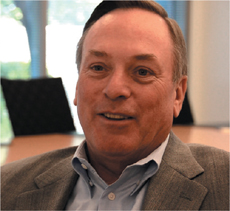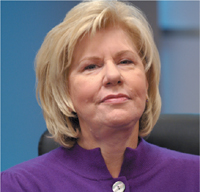CHAPTER
16
Career Challenges
You, more than any other person, are responsible for the welfare of all. You have this collection of responsibilities that make you different than other people.
—Mark Leslie
Pressures come when you get to flying high and it changes your world so dramatically.
—Brenda Rhodes
How you handle it when things are going well doesn’t matter. It’s when things aren’t going well—that’s when it matters how you handle it.
—Rick Wallace
Being CEO is 100 percent of your life. Eighty percent of it is crap, but the other 20 percent is so much fun it makes it worth it. It has a life cost.
—Ginger Graham
Our executives “opened the kimono” when asked what advice they would give to those aspiring to top-level positions. They shared the reality of the ascent to power. They talked about the impact on their families and about the responsibility of running a major corporation. The bottom line of this chapter is: if you have your sights set on a senior leadership position in a Fortune 500 company, pursue it with your eyes wide open.
Reflecting on the challenges of their careers the executives talked a lot about responsibility. While being a CEO can be the greatest job they ever had, they told me it can also be a heavy weight, one you have to be ready to shoulder if you want to be a top executive.
It’s a Heavy Load
The rewards are great, and so are the responsibilities. “When you’re CEO, it’s about other people all the time,” said Mark Leslie. He added:
I’d go to the company picnic, and I’d see this sea of faces. It’s humbling. People relying on the company for their livelihood, their mortgages, their kids’ college tuition. You feel the weight of that responsibility. It’s not something people talk about.
Dan Eilers agreed:
Recognize that it is a weighty responsibility. The decisions you make and the actions you take are not just for you. They are for the people who are working for you. My employees are affected by decisions I make and how hard I work. As a CEO, your decisions will affect whether they can feed, clothe, and educate their children.
So, how do you become a leader? “There is no handbook,” says Harold Fethe. “There’s an expectation that if you are working at this level, you already understand these things or you just figure it out. But there’s nobody there to hold your hand or make it easy. It’s a Darwinian ‘survival of the fittest’ mentality.”
For Ginger Graham, being CEO is about a larger contribution to society, and on the plus side, the joy of giving people a chance to grow into their destinies:
It’s very sobering to be the executive in charge. You cannot avoid the personal accountability that your decisions have: the opportunity to have impact; to lead; to help form a culture; to inspire people to be great. All of that does wonderful things for society.
So, there’s no getting away from the weight of the job. And I was always weighing the wonderful things about being a CEO against the junk that I don’t like. It’s hard, and it is a burden. For me, though, to be with people and see them be all they’re capable of and deliver great work was always more powerful than the negatives of the job.
Being CEO can be a double-edged sword. According to Rick Wallace:
It’s a load. It’s also an unbelievable opportunity. It’s the best job I’ve ever had, but there’s stuff I can’t control. I’d been CEO for only five months when the stock option investigation hit. Next came the downturn and the fate of the company was at risk. I’ve got 5,000 scared employees. We had to let some good people go, and our future success wasn’t assured by any stretch.
The challenge in the CEO position is that it is natural to identify with the job, to become the job. That’s dangerous because the job isn’t permanent.
Stress and Personal Change
One day when she was CEO of Advanced Cardiovascular Systems, Ginger Graham got a disturbing phone call: “There’s a man in the manufacturing plant with a shotgun.” The caller was urgent and tense, “What should we do? Empty the building? Call the sharpshooters?” Ginger reacted with frustration, thinking to herself, “Oh my God, I didn’t sign up for this.”
Susan, 42-year-old senior director at a Bay Area biotech company, found herself changing as she moved up. In one of our trainings, she had just heard the tough adjectives people use to describe their top leadership (see Chapter 2). She got a faraway look in her eye, like she had a new insight about something very important. After the workshop, she confided, “Look, I am moving rapidly up the management chain. I am headed for the C-suite, and I know I’m becoming a real asshole.” She went on, “I am more time-pressured than ever. I don’t have patience to listen to people’s problems. I have decisions to make, and quickly. This is just where I want to be in my career, but sometimes it’s not a pretty picture.”
The good news in that story is that Susan is clear about where she is going, and what it will take to get there.
The Personal Price
I have talked to many CEOs who have lost their relationships.
—Brenda Rhodes
It’s difficult to be the CEO of a company and satisfy the constituencies you have at work, and also pay sufficient attention to the constituencies you have at home.
—Dan Eilers
Working at the C-level is personally demanding. John Kispert observed:
I’m passionate about what I do, and that commitment is probably the biggest driver for me. I’ll lock on what we need to get done and be uncompromising and disciplined about it. That takes physical and mental sacrifice, but it’s the only way to get there. So you have to find a way to enjoy that.
The job puts strains on families and marriages. John admits he doesn’t see his wife as much as he’d like:
We try to take time to be together one night a week when we can. It’s not like we go out a whole lot. We just sit somewhere and get caught up. Vacations are often stunted and slowed down because I’m on the phone all the time.
That kind of single focus, to say nothing of the travel, the time demands, and the pull of various constituencies requires management. The executive must be able to make it all work. Dan Warmenhoven commented that, “If you’re going to be able to manage a large corporation, you ought to be able to manage your own life first.”
For Dan, the family and the job were both priorities; rather than “either/or,” it was “both/and.” His solution was to bring the family along on business trips, spend a few extra days, and make it a mini family vacation:
I remember when I was at Hewlett-Packard I had to spend a few days in the UK. I got my wife to come and join me and bring the kids, and we toured old England. I mean the point is you can mix these things together if you are committed to both objectives as being very serious.
Dan was quick to add that his wife let him know when adjustments needed to be made:
Now it helps to have a spouse who hits you upside the head when she (or he) thinks you’re getting out of balance, and my wife did. She’d say ‘It’s time to spend more time at home,’ but she was also cognizant of busy periods. Not everything is smooth. There are peaks and valleys, and the key is to make sure when you come off a peak in the company you spend whatever free time you’ve got back with family. I don’t think my children felt deprived of a father, and I don’t think my wife felt deprived of a husband. We have a very normal life.

Dan Warmenhoven
That balance eludes many. At least two people felt the stress of their jobs contributed to their divorces. For Brenda Rhodes, the huge change in her financial situation after her successful IPO proved too much for the marriage:
I have since talked to people who’ve experienced a sudden change in their financial situation, like an IPO. It puts weight on everything in your life, including all your personal relationships. It happened to me. Pressures come when you get to flying high and it changes your world dramatically. I’ve heard about the same thing happening with lottery winners.
The Myth of “Work/Life Balance”
This issue has been famously addressed by Carol Bartz, well known Silicon Valley CEO, when she noted that “work/life balance” is a myth that only leads to counterproductive guilt for working mothers. She warns, “Women put a lot of pressure on themselves. They think, ‘I’m going to cook a great breakfast, wash up the dishes before I leave, take the kids to school, call my college roommate on my way in to work, be a CEO all day, volunteer on the way home, do a little exercising, cook a wonderful dinner, help with homework, and have sex.’ I don’t think so.”1
Pick the Right Spouse
Every executive I spoke with was aware that the demands of a big career at the top of a major corporation can wreck a marriage. They echoed a common theme: make sure that the person you partner with understands the nature of your career demands and supports your aspirations … and that’s just the beginning.
Ginger Graham recommends getting the right life partner and getting help on the homefront:
There’s no doubt that there’s a tradeoff off of time. You lose control because your employees, your customers, and your constituents have a lot more say over how you spend your time.
The Number One piece of advice I give young women who want to lead organizations is: pick the right partner. Make sure that you marry a man who loves your capabilities and your potential, and is willing to support you. It must be a partnership that includes family care and the running of the household. If there’s someone at home who says every time you work late, ‘What are you doing there? Why weren’t you home early?’ that is not pressure that you can sustain at home and have a growing career.
For many women I say, ‘Hire a housekeeper and get over it. Build circles of friends who’ll help you. If you have children, have carpool buddies who’ll always pick up your kids from school if you miss your flight. And remember you’re not in it alone. You’re not carrying the load by yourself. You have a partner; you have family; you have friends; you have neighbors; you have business colleagues. Use that network and don’t be afraid to ask for help.’

Ginger Graham
Brenda Rhodes notes that there are a few men who can support their high-achieving wives, but that’s rare:
I’ve met some up-and-coming young women executives who have husbands at home that are helping raise their children, that are supporting their wives. It takes an extremely self-confident and independent and self-assured man to be with a woman who has the kind of aspirations that I had, and that women who succeed at my level have. If you are a woman who wants to get to the big chair, there are trade-offs. Those trade-offs happen in your relationships.

Brenda Rhodes
Dan Eilers reflected on this dilemma in terms of advice for his daughter:
I would say to her, ‘Megan, if that’s what you want to do with your life (become a corporate executive), that’s terrific. I support you fully in that. Just make sure that the guy in your life understands, before you get committed, that that’s going to be an element of your life, because it’s really important to you.’ For me, it was a difficult balance. My heart was always at home. My heart was with my wife, and with our daughter, and yet my customers were all over the world.

Megan Eilers
Along the same lines, Scott McNealy, co-founder and former CEO of Sun Microsystems in a keynote address to the Endeavor Entrepreneur Summit, advised people starting out in business:
Start your company before you get encumbered financially and with kids, because you’re going to work a bazillion hours. Also, the most important strategic decision you make in your business career—this might surprise you—is who you choose to have babies with. That person is going to be a big part of your life and if you pick the right person it will make you a better leader, a more focused leader, and a leader who can spend more time on your business without feeling bad about leaving your kids home alone. This is very, very important.
Flying Without Radar
When you run a company you have 1,000 mirrors in the faces of your employees looking back at you. You see your weaknesses pretty clearly.
—Ginger Graham
As you become a senior person in an organization suddenly people don’t treat you as a person. They treat you as an obstacle, or as a hurdle, or as a potential foe.
—Felicia Marcus
When I became an Admiral a wise mentor told me, ‘While you will never be presented with all the truths and facts, you will never have another bad meal!’
—W. W. Copeland, Jr.
Rear Admiral, U.S. Navy (Retired)
Open communication is critical. The status and power of the CEO position can create serious problems:
• Isolation because of people’s fear of being direct
• Executives only hearing reflections of their own views
• Bad decision making because the CEO loses touch with business realities
Brenda Rhodes had a deep concern about communication:
I’m always conscious of how hostile or rewarding the presentation environment is to get the kind of communication I want. If it is too hostile, it will shut people down from giving me the truth, and that would mean I’m flying this airplane with no radar. That would be bad news.
As these executives moved up the hierarchy, people started treating them differently. It was hard to get direct, honest feedback. If people brought good news, they were suck-ups. If they brought bad news, they feared being fired. Consequently, senior leaders can get walled off from reality.
Ginger Graham noted:
You get this funny little business card that says ‘CEO.’ Nobody ever talks to you anymore. What information finally gets to you has been filtered, sifted, canned, and purified.
The job of a CEO is a very unnatural act. People expect you to always be smart, to have the answers, to never have a bad day, or be in a bad mood. And if you are human, all of those things happen, and then people get afraid when you snap at them. If you pop off an inappropriate comment, they think their career is over.
Each of your actions takes on a disproportionate size, and then the question is, can you be so self-disciplined every day, every moment, every meeting, every presentation to be thoughtful, insightful, and to be aware of what’s going on with the person presenting to you and still execute your duties as an executive. It’s a very high hurdle, and over time, of course, it’s impossible. We’re just humans, too.
The best approach is to find a way to relate to all of the people you’re working with as humans, so that mistakes are allowed, and yet standards are kept high in the organization because we’re all in it together.
In my coaching with first time CEOs, I tell them to remember that it’s not their job to know everything, and to, in fact, express themselves as a human who is learning, has interest in others, and needs other people around them to be successful. It’s important to build an open environment that’s honest and that draws out the opportunity for everyone to speak openly and help each other be successful. I’m guaranteeing a failure over time for a CEO who won’t get feedback and isn’t accessible to other people.
So, as a CEO you actually live in this artificial bubble where no one tells you the truth, either good or bad. How can you grow, how can you be successful, how can you continue to improve your own capabilities and skills if no one will be straight with you? That’s the barrier you have to break down.
Harold Fethe said that it is hard being in the fishbowl:
You can never get off stage. You are constantly in the spotlight, and any unguarded moment can actually hurt your organization or your relationship with another employee. It’s a kind of tyranny of being on display all the time.

Mark Leslie
Mark Leslie was very concerned about his impact as CEO on information flow:
It’s very important as your organization gets large to be able to stay in touch with reality. The impact of what you say gets multiplied 1,000 times, and that is a great risk because your voice drowns out other voices. You only hear yourself by reflection, so you stop understanding reality and you make bad decisions.
My goal was to make presenters feel at ease, otherwise they will tell you what they think you want to hear. If that happens, the executives lose touch with what is going on in the business.
Staying True to Your Vision
To get the free flow of information he needs, John Kispert feels he must hold back his opinions:
I’m surrounded by a lot of people—boards, customers, investors, bondholders, employees, consultants—all who want it their way. My job comes down to: what’s right for this organization as a whole? If I share what I’m thinking, it only influences people in how they’re going to present to me. I need to listen to them all, pull it all together, and make the decision.
The CEO’s job means: the buck stops here. The hard part is, how do you listen to all that and not compromise the values, the strategy, and the vision of the organization in making that decision? And that means you’re going to disappoint a preponderance of those groups. I’m more and more comfortable with that over the last 10 years. It means a lot of contemplating, generally alone, after I’ve gathered everything I need to know.
Summary
While the view from the top is spectacular, the journey can be hazardous. The communication challenges are huge. You need to keep the channels open at work and at home as you move up in the organization. In addition, there’s the reality that decisions these executives make affect the lives and futures of thousands of people. And all of this is on top of the business pressure to keep the company growing and the investors happy. So I asked our executives for their advice for people on that upward journey. Chapter 17 is about what they said.
